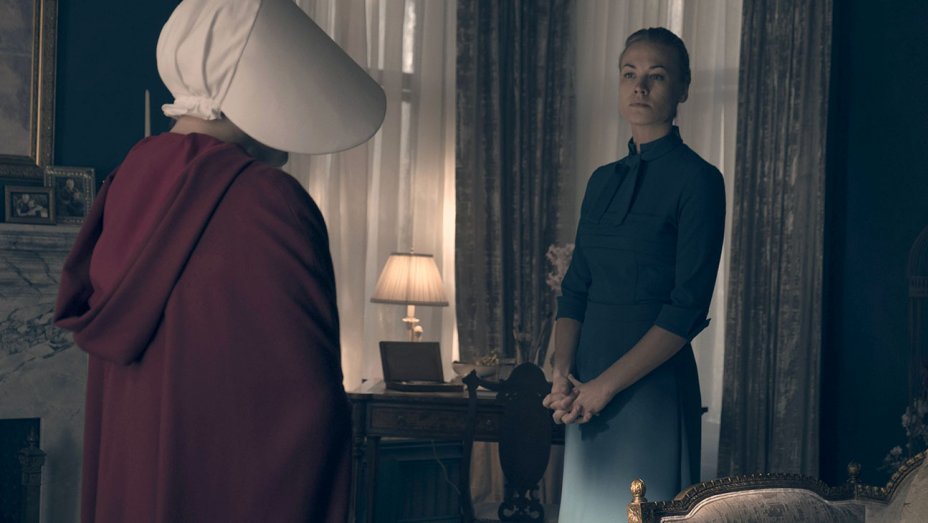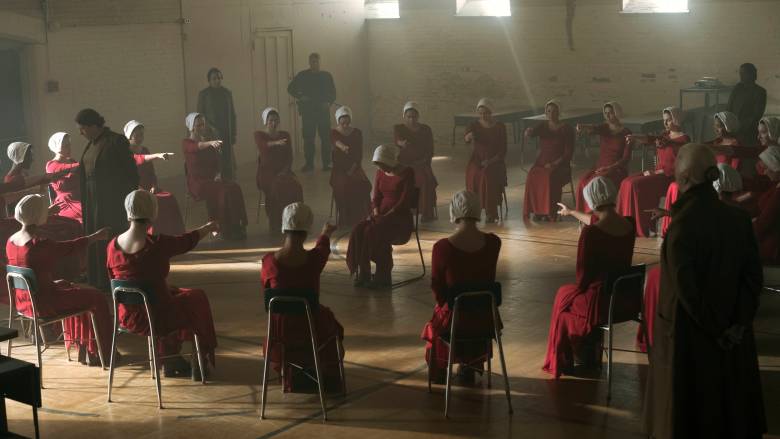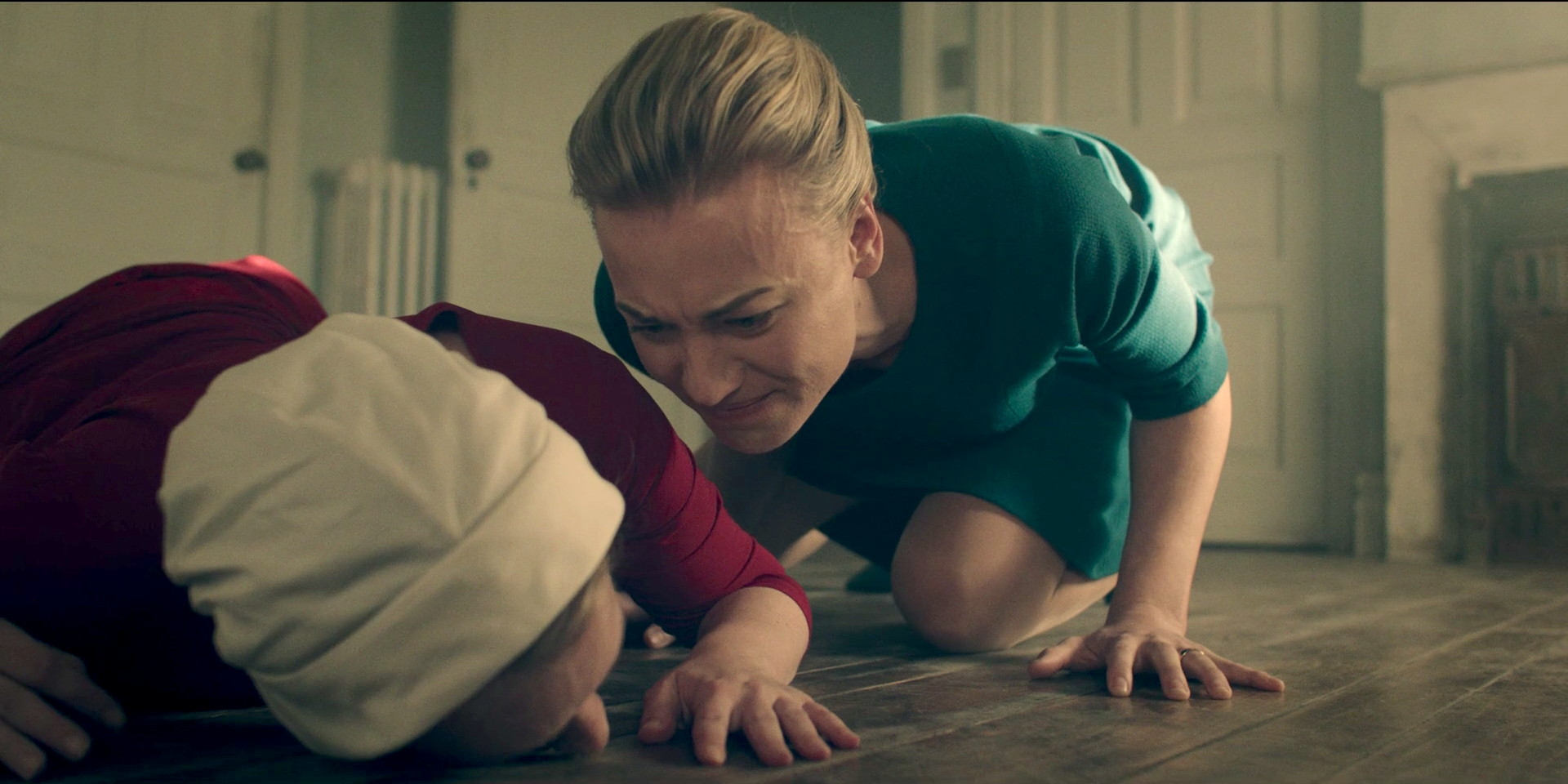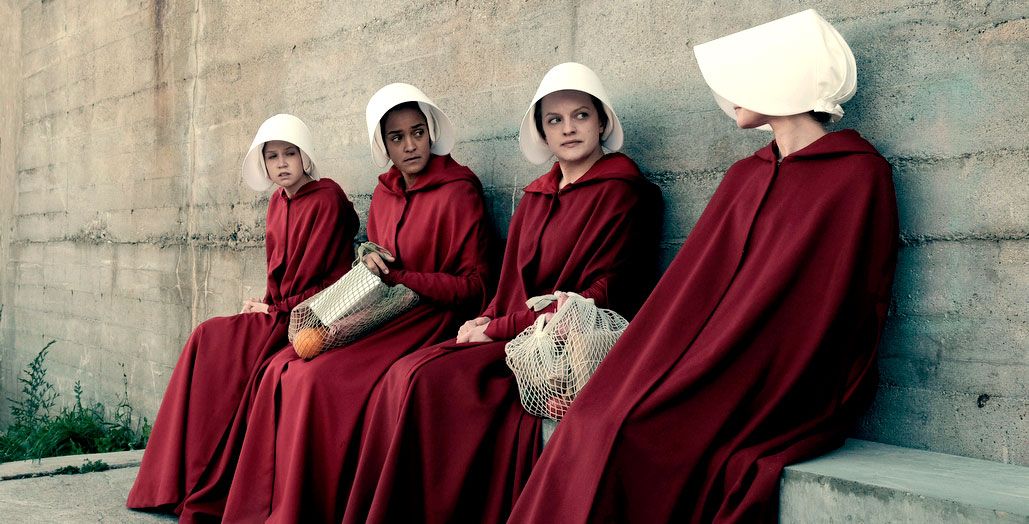Margaret Atwood’s 1984 novel, The Handmaid’s Tale, echoes the historical belief that men are the perpetrators of oppression, while Hulu & MGM’s 2017 television adaptation suggests that some women are just as culpable for the misogynistic foundations of the Republic of Gilead – sparking the debate: are women the real gender-traitors in this not-so-dystopian near-future?

Atwood’s novel paints an oppressive dystopian landscape created from privileged Anglo males exerting dominance over a society they believed to be devoid of puritanical values.
However, the TV series heavily implies that Serena Joy (the Commander’s wife) was also an instigator of such oppression after it is discovered that she was a conservative activist. Serena, who admits to having “quite the temper” in the past (a rather chilling comparison to her ice cold demeanour of today) used to make impassioned speeches at rallies and even published a book called A Woman’s Place whose subject and rhetoric borrows from the tired notion that a “woman’s place” is in the domestic setting of the home. It was Serena’s vision of a theocratic society that played a key role in propelling the Commander’s involvement in overthrowing the American government and establishing the Republic of Gilead.
Even more disturbing is Serena casually floating the idea of “fertility as a national resource, reproduction as a moral imperative” to the Commander as the subject of her second book. It is perhaps the greatest and most brutal irony of this world that it was inspired by the ideas of a woman who was never given credit for them and then consigned to a life devoid of any intellectual stimulation. Mrs. Castillo (a Mexican ambassador) asks Serena if she ever imagined a society where women are banned from reading not only her book but any books at all and when Serena answers honestly that she didn’t, it’s somewhat of a revelation. Whatever world she imagined it wasn’t this one but make no mistake, she was complicit in creating it.
Yet, sometimes we are also complicit in the oppression of our fellow women. We are often so quick trigger to blame the patriarchy for gender inequality that we are rendered blind to any female accomplices. In an essay for the New York Times ‘Margaret Atwood on What The Handmaid’s Tale Means In The Age Of Trump‘, Atwood commented on the narcissistic tendencies that women exhibit:
“It was way too much like way too much history. Yes, women will gang up on other women. Yes, they will accuse others to keep themselves off the hook: We see that very publicly in the age of social media, which enables group swarmings. Yes, they will gladly take positions of power over other women, even — and, possibly, especially — in systems in which women as a whole have scant power”

Social media has steadfastly enabled a sickening trend of online bullying and torment, providing a platform for individuals to be subjected to ridicule and abuse. More often than not, the victims of this abuse are women. The perpetrators? Other women.
Victim-blaming and slut-shaming are typical weapons of torment in the female arsenal. Whether it is an act of jealousy or an effort to comply with the patriarchal defence of ‘she was asking for it’, this form of abuse is a prime example of anti-female rhetoric. The antagonistic Aunts burgeon this behaviour by cattle-prodding the Handmaid’s into victim-blaming and shaming fellow Handmaid Janine for having been gang-raped.
In an interview with INSIDER, series showrunner Bruce Miller admitted to casting a younger Serena Joy (as opposed to the presumed elderly and arthritic wife characterised in the novel) as a means to convey a competitive streak and subsequent jealousy between her and her Handmaid, Offred. Yvonne Strahovski, who plays Serena, already physically towers over Elizabeth Moss (Offred) before she dons the trademark blue heels of her caste. The powerful image of Serena literally standing over Offred further cements the female oppression she so wilfully traded for her own selfish gain.

Conversely, any woman that has enjoyed a night out on the town will have witnessed and perhaps even admired the innate bonds of womanhood displayed amongst mere acquaintances in the women’s bathroom. The 8th episode, ‘The Jezebels’, pays homage to this unspoken etiquette when Offred is reunited with her best friend, Moira. The women’s restroom in which they meet is symbolic of a sanctuary, a place where they can temporarily escape the confines of their oppression – until an Aunt interrupts and casts Moira back to the bar teeming with lecherous commanders. This scene illustrates a chilling metaphor for women complicit in other women’s oppression: invading the safe haven, rejecting the implied camaraderie borne of this space, and then breaching the unspoken contract of sisterly protection from unwanted sexual advances.
Serena is so desperate for a child of her own that she sacrificed the well-being and civil rights of her gender to advance her own agenda. While she welcomes the idea of fertility as a commodity, it is later revealed that Commander Waterford was tasked to ‘sell the idea’ of the monthly conception “ceremony” to the wives. Serena is clearly perturbed with the process, but her discomfort is a sacrifice she must accept to yield the fruit of her pre-Gilead endeavours. It is almost karmic retribution that the conservative revolution Serena so desperately envisioned has also rendered her subservient.

This show is by no means a call-to-arms to the sisterhood; Moss reminds us that the inevitable goal is gender equality, “Men and women are both humans, so, for me, that makes my characters and the work that I do human stories”. In an already divisive world, amidst an increasingly unstable political climate in which misogyny undeniably runs rampant, it is important for everyone – not just women – to stay awake. As Offred pensively narrated, “we didn’t look up from our phones until it was too late…”
Season 1 of The Handmaid’s Tale is available now on Hulu by subscription. The full series will be available to stream in Australia on SBS Demand from Thursday 6th July, 2017.







